- Home
- Kathy Reichs
The Bone Collection: Four Novellas Page 2
The Bone Collection: Four Novellas Read online
Page 2
“At Carolitaly we try to integrate art with nature.” Kahn spoke as we walked. “Throughout the compound are living installations. Beauty in unanticipated places.”
“Ah.” I was clueless.
Five yards into the woods, Kahn stopped and arced an arm skyward. “Beauty in the trees.”
A Plexiglas and metal capsule sat affixed to the branches of an oak ten feet above our heads.
“Let me guess. A space ship?”
“A vessel for the contemplation of space. A person seeking tranquility can sit inside and meditate. Glass allows light to enter, but enclosure prevents distraction, allowing one to direct one’s thoughts inward.”
“Ah.” Modern art, not my thing.
Kahn continued toward a pine-needle-covered mound outfitted with a refrigerator door and porthole. Wordlessly, he tugged open the door and directed me to look inside.
A buried pod held a round table surrounded by a curved bench. The walls, floor, ceiling, and furnishings were plastic, a warmthless, hospital white.
“Up to three people can survive underground for days.”
Not this chick, I thought.
“There are thirteen of these on the property. Thirteen is the number for rebellion, apostasy, defection, disintegration, revolution.”
A survivalist’s wet dream.
“For a while now I’ve been seeing signs of a squatter at some of the pods.”
“Any idea who?”
“Ever heard of monkey-wrenching?”
“Eco-terrorism.”
Kahn nodded. Ran a hand over his jaw.
“The fellow you want to talk to is that wing nut, Herman Blount. Back in August, Blount posted some videos online threatening to blow up the Riverbend station. Then he went off the grid.”
“You think Blount’s gone to ground on your property?”
Kahn nodded glumly.
“If anyone’s capable of violence, it would be Blount.”
When I entered the Mecklenburg County Medical Examiner facility early Monday morning, Mrs. Flowers, the receptionist, was at her post. As usual, her outfit was floral, her hair a perfectly permed and sprayed peach helmet.
I waved, crossed the reception area, and carded my way into the biovestibule leading to the autopsy suites and staff offices. “Biovestibule” is what you call a three-hundred-million-dollar hallway. Hot damn.
Our recently built, state-of-the-art, LEED-certified MCME facility still has that new-car smell. After decades in the old, refurbished Sears-Garden-Center-make-do quarters, everyone on staff is loving the new digs.
I headed to autopsy room four, one of a pair specially ventilated for aromatics: decomps, floaters, putrefied corpses. My stinkers.
As I detoured to my office to lock my purse in a drawer, Larabee appeared. In his off time, the chief enjoys long-distance running. A lot of it. The hours on the pavement have turned him into a lean and leathery Ichabod Crane in surgical scrubs.
“How’d it go at Mountain Island Lake?”
“Beat the storm.” I straightened to face him.
“Joe said it rained like hell on the drive back. Wind almost knocked the van off the road.”
Joe Hawkins has been a death investigator with the MCME since before Moses discovered clay.
“I didn’t see Joe’s name on the sign-in board. Where is he?”
“Out with pink eye. Do you mind working alone?”
“I mind it less than pink eye. Where are my bones?”
“In the cooler. Joe did prelim photos and X-rays, then left everything on the gurney.”
“Busy weekend?”
“Not bad. One stabbing, an electrical death, and a murder-suicide. Nothing for you.”
In our strange industry, that roster qualified as “not bad.”
“Keep me looped in.” With this, Larabee was gone.
Relieved I had no other cases, I snapped a form onto my clipboard, went to the locker room to change, then headed to the cooler. I hoped forty-eight hours of chilling had diminished the smell. Knew that wouldn’t be so. At least not for long.
After wheeling the gurney to room four, I gloved and strapped goggles onto my head. Then I slapped a mask onto my face, and finished with a plastic apron tied behind my neck and waist. Fetching.
Ceiling-mounted surgical light on. Industrial-strength fan blades whirring. I was ready.
Joe had done a good job articulating the bones while still leaving them inside the clothes. After years assisting me tableside, he knows what I want.
The skeleton lay supine, with limbs slightly splayed. Savasana posture. Weird, but that phrase popped into my mind. Corpse pose.
The hair mass had sloughed from the skull during transport or handling. It lay to one side, filthy with rotting vegetation and other lacustrine debris.
I flipped on the light box. Joe’s full-body X-rays revealed nothing extraordinary.
Back at the gurney, I paused, studying what remained of a person. Water is not kind to the dead. The bloat is grotesque, the smell nauseating. That phase had largely passed, leaving only bone and shreds of putrid flesh.
Yet this had been a human being. I felt the usual stab of sorrow. Hair always does that to me. Evokes the simple act of brushing, ear-tucking, tossing in a breeze.
Somehow my brain was channeled on yoga. It now fired an image, a class I’d recently attended. “Set your intention,” the instructor had said. “There is power in your thoughts.”
My gaze roved the body. I set my intention. A name. A final trip home.
Time noted on the form: 8:38 A.M.
I lowered the goggles, raised the mask, and began.
First I ran a magnifying lens over the clothing. Spotted a few short hairs, likely animal. Plucked and placed them in a plastic vial.
Next, using scissors, I cut up the center of the thin olive T-shirt proclaiming HAPPILY EVER RAPTOR, and spread the two halves to either side of the torso. The jeans took more effort, but eventually they, too, lay halved and peeled back on the stainless steel. When finished with the bones, I’d remove and examine the clothing more closely.
A skeletal inventory revealed every element present. Surprising, given the breach in the bag.
A nonprominent nuchal crest, smooth brow ridges, and small mastoids suggested female gender. Pelvic traits were in agreement with those on the skull.
The cranium was relatively long and thin. The nasal bridge was low, the opening wide. I ran measurements through a software program called Fordisc 3.0. Every indicator pointed to African American ancestry.
Determination of age requires more minute examination. At birth, the skeleton is only partially complete. Throughout childhood and adolescence extra bits appear and attach to the ends and edges of bones. Components of the vertebrae and pelvis fuse.
The clavicle is the last to complete the process. I examined both, where they met the breastbone. Each had a cap firmly affixed to its tip, but a faint squiggly line told me fusion had occurred shortly before death.
I checked the arm and leg bones. The pelvis where the two halves met in front. The ribs where they attached via cartilage to the sternum.
To confirm my skeletal estimate, I pulled the postmortem dental X-rays from their tiny envelope and popped them on a light box.
Minimal wear on all occlusal surfaces. Root formation complete throughout the arcade. Every age indicator told the same story. Young adult.
A femoral measurement placed the woman’s height at solidly average. Small muscle attachments suggested she’d been of slight to medium build.
I reviewed the data I’d entered onto the case form.
Female. Black. Twenty-three to twenty-seven years of age. Between five foot five and five foot eight.
I found the missing person file the cops had sent over with the first four bones.
Edith Blankenship fit the profile in every parameter.
I unclipped the photo and studied the subject.
A girl smiled from under a tasseled mortarboard, curly bla
ck hair framing her face. She wasn’t pretty, wasn’t homely either. Just plain. But the set jaw and straight-at-the-camera gaze conveyed confidence and determination.
The media had flashed the same image for a week or so. Until fresher crimes drew the attention of law enforcement. Until news coverage shifted to flooding in the Midwest. Then Edith Blankenship dwindled to tattered flyers posted on telephone poles in northwest Charlotte.
Edith’s case was briefly reinvigorated by the Mountain Island Lake bones. Those investigating her disappearance were certain the file would shift to Homicide or move to the “closed” category in some other way. I’d dashed their hopes.
Had Edith finally turned up?
My mind shifted to PMI. Postmortem interval.
I checked a date. Edith Blankenship was last seen alive on September 8.
Fall had been unseasonably warm, even for North Carolina. The torn bag had allowed access to fish, turtles, and other aquatic scavengers. They, along with the normal spectrum of bacteria, had done their job.
My first impression, the level of decomp looked good for an early September immersion. But I’d need to verify.
I straightened, arched backward, then rolled my shoulders. I was again thinking yoga when my stomach growled.
The wall clock said 1:03 P.M. I was starving.
I removed my mask and tossed my goggles to the counter. Stripped my gloves and apron, balled them, and tried a layup into a biohazard can. Two points.
Quick hand wash, then I returned to my office. I was fantasizing about a giant sub when the desk phone rang.
I considered letting the call roll to voicemail.
Picked up.
Big mistake.
“Thanks for sending a floater into my basket.”
Charlotte Mecklenburg PD Homicide investigator Erskine “Skinny” Slidell had not been pleased by my call on Saturday. I’d fled behind the transport van, leaving him debating jurisdiction with Officer Skip. Junkyard dog vs. Jersey barrier.
“You’re welcome.”
“You tossed in the Unabomber for shits and giggles?”
“Have you found Herman Blount?”
“Oh, yeah. Prick looked like Saddam friggin’ Hussein peering outta his spider hole. I’ll let him sweat awhile, think about the good times out hugging trees. Then I’ll grill him.”
“I’d like to be there.”
“How come that don’t surprise me?”
The Law Enforcement Center is on East Trade Street, in uptown Charlotte. The drive took ten minutes.
Skinny met me on the second floor, beside a door marked VIOLENT CRIMES DIVISION. Behind it were Homicide and ADW, assault with a deadly. Blount was in the farthest of three interview rooms on the opposite side of the hall.
“Mr. Birkenstocks and lentils has spent the past six weeks underground. Smells like shit.”
Coming from Skinny, this was a statement.
“What’s his story?”
“Guy’s got a beef with coal power. And hydroelectric. And logging, mining, farming, ranching, pesticides, the fur trade, animal testing, zoos, circuses, rodeos, McDonald’s…”
“You’ve already questioned him?”
“Asshole hasn’t shut up since I hauled his sorry butt outta his hidey-hole. Keeps grinding on about coal ash and arsenic and fish having trouble porking.”
“Do you think Blount’s a serious threat?”
“Your artist buddy was right about the videos.” Slidell shook his head in disgust. “The dude with the squirrels growing on his face—”
I rotated a hand, indicating he should skip the comments on Kahn.
“Blount posted a bunch of boom-boom DIYs on YouTube. Going for an Oscar in dumbfuckery.”
“Does he have a record?” I made a mental note to check out Herman Blount’s stylings on sabotage.
“String of minors. Criminal trespassing. Vandalism. Destruction of property. Got busted for spiking trees about eight years back, did a bump with the feds. Caused $400,000 in damage to logging equipment. Dumb moob left prints all over the spikes.”
“Any crimes against persons?”
“Iredell County cops like him for two nonlethal pipe bombs. One at a chinchilla ranch, another at a joint that offs dogs so surgeons can learn how to cut. The guy’s slippery as goat snot. Nothing’s sticking so far.”
“This is only a prelim, but the bones in the bag look good for Edith Blankenship.”
“Yeah?”
“Black female, early to mid-twenties. I’ll need dentals for a positive.”
“Any signs of trauma?”
“No. But I’m guessing she didn’t zip herself in to go for a dip.”
“You’re thinking body drop?”
I nodded.
“Still don’t mean murder. She could have OD’d, or had some other kinda accident, her pals panicked and off-loaded the body.”
“Maybe.”
“Why’d she surface?”
“As a corpse decomposes the body cavity fills with methane gas produced by bacteria in the gut. The bloating, helped by flooding, likely floated the bag.”
“You’re always so full of sunshine, doc.”
“An experienced killer would puncture the gut and intestines, then weight the container so it stays down. Blankenship was amateur hour.”
Skinny opened his mouth to comment. I didn’t let him.
“Find anything linking Blount to Blankenship?”
“They’re into the same save-the-Earth shit.” Slidell pulled a small spiral from his jacket, spit-thumbed a few pages, and read. “Blankenship’s enrolled in the environmental sciences master’s program at UNCC. Before that she worked for Impact Watch, a nonprofit that studies the effects of development on wildlife in western North Carolina. Their HQ is in Mount Holly.”
“Right up the road from Mountain Island Lake.”
I raised my brows. Skinny raised his.
“Who reported her missing?”
“Grandmother.” Slidell’s eyes dropped to his notes. “Ada Wilkins. Blankenship lived with her. Went to school one day, never came home.”
“Who caught the case?”
“Hoogie Smith. He says Blankenship was a loner. Didn’t work, no boyfriend, no besties. Father was never in the picture, mother was dead. He followed up what leads he had. Interviewed a few profs, Ada Wilkins, some of her neighbors. Wilkins admitted her granddaughter had taken off once before, after the mom died. The kid had no credit cards, nothing like that. Everyone figured she got fed up and legged it out of town.”
“Cell phone?”
“Traced to a tower near UNCC the morning she went missing. Then the thing stopped working.”
I knew what happened when the leads fizzled out. Blankenship’s folder went into a stack with other MP files. Was buried deeper and deeper as the pile grew higher.
Slidell jerked the spitty thumb at interview room three.
“I don’t want to spook this toad. You watch from two.”
I did as directed. Sat at the table with my arms crossed.
In seconds a small monitor kicked to life and tinny sound began sputtering through a wall-mounted speaker.
Blount looked up as Slidell crossed the room. He wasn’t what I expected. Surfer-dude blond hair, chiseled features, electric blue eyes. Save for the ratty beard, he looked more Christian quarterback then eco-saboteur.
And Blount had obviously seen some gym time. Broad shoulders. Upper arms the size of utility poles. Washboard abs beneath a long-sleeved T.
Slidell took a seat. Placed a folder on the table. One by one withdrew pages. Positioned them neatly. Slowly read. Or pretended to. I knew the routine. Put the interviewee off balance by making him wait.
“I’ve done nothing. You can’t hold me.”
Slidell continued as though Blount hadn’t spoken. After several unhurried moments, he finally laced his fingers and dropped his hands to the roll lapping over his belt.
“Here’s what I’m asking myself, Herman. You good with that
? Me calling you Herman?”
Blount only glared.
“Why does a guy with nothing to hide go underground?”
“Every day we’re surrounded by cancer-causing high-voltage power lines. I go to earth periodically to give my cells a break from the constant bombardment of electromagnetic radiation.”
“Mm.” Slidell nodded, as though thinking about that.
“And it’s peaceful.”
“That why you sabotage utility companies? ’Cause they’re frying your balls?”
“I don’t sabotage anyone. But if I did, it would be a justifiable act of self-defense. The Riverbend Steam Station is poisoning people by dumping coal ash into the water supply. It should be stopped.”
Stoked either by zealot fervor and/or lunatic fury, Blount’s eyes blazed like two gas flames. Mesmerizing. I wondered if Edith had been caught in his spell.
“Ever think of suing?” Slidell, the voice of reason.
“The courts are useless. The government’s complicit. Pollutants keep people weak and submissive.”
“Explosives are much more direct.” Skinny leaned forward to consult the file. “Like at Destin’s Chinchilla Ranch and Arnett Labs.”
“You have the wrong guy. I was never charged.”
“You did a stretch for spiking a tree.”
“A foolish youthful impulse. I know better now.”
“So these outfits you target online. They magically blow themselves up?”
“Obviously I’m not alone in my views.”
Blount held Slidell’s eyes, confident, composed. But a blanching of his lips suggested pent-up emotion. Anxiety? Rage?
“Cop lost a thumb defusing the Arnett bomb.”
“Small sacrifice compared to the animals they tortured.”
“What about Edith Blankenship? She a small sacrifice, too?”
The quick segue was meant to catch Blount off guard. I watched his face closely. No reaction.
“Who?”
“Grad student at UNCC.”
Blount shrugged one well-muscled shoulder.
“Maybe you two hooked up at Impact Watch. She Xerox your manifesto for you? You can write, can’t you, Herman?”
Blount didn’t rise to the bait. “Impact Watch is made up of lackeys. The government pats them on their heads, pretends to listen. The problems continue, nothing is solved.”

 Two Nights
Two Nights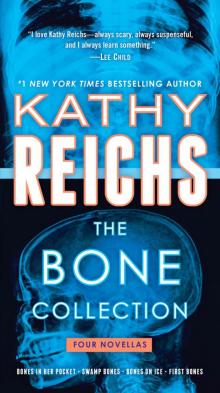 The Bone Collection: Four Novellas
The Bone Collection: Four Novellas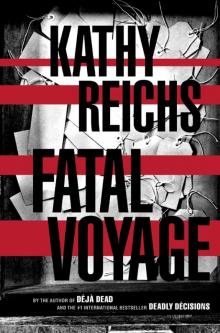 Fatal Voyage
Fatal Voyage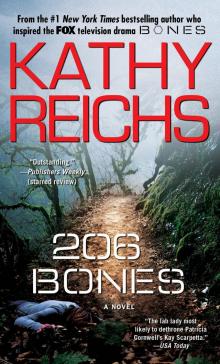 206 Bones
206 Bones Bones to Ashes
Bones to Ashes Terminal
Terminal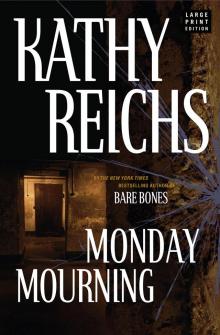 Monday Mourning
Monday Mourning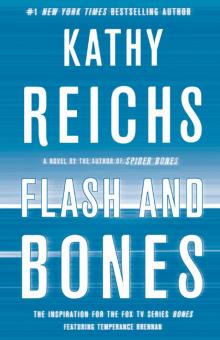 Flash and Bones
Flash and Bones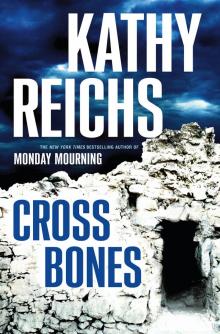 Cross Bones
Cross Bones Devil Bones
Devil Bones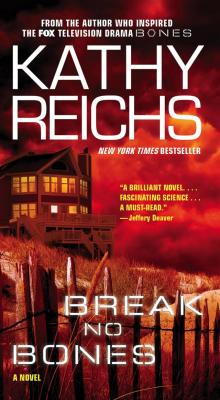 Break No Bones
Break No Bones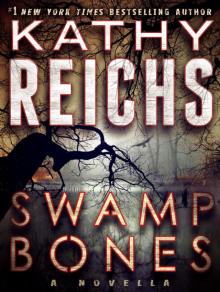 Swamp Bones
Swamp Bones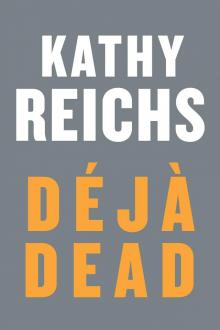 Déjà Dead
Déjà Dead Shock
Shock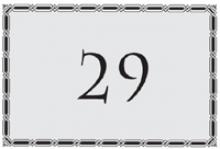 Spider Bones
Spider Bones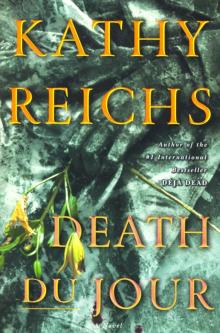 Death Du Jour
Death Du Jour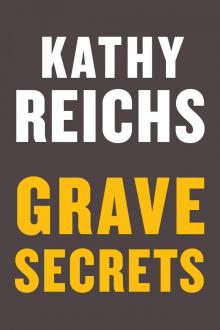 Grave Secrets
Grave Secrets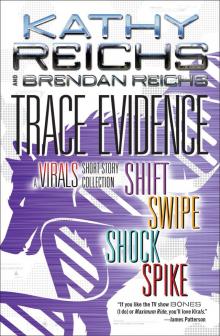 Trace Evidence: A Virals Short Story Collection
Trace Evidence: A Virals Short Story Collection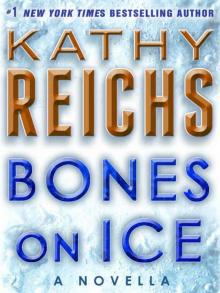 Bones on Ice
Bones on Ice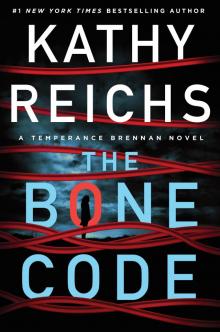 The Bone Code
The Bone Code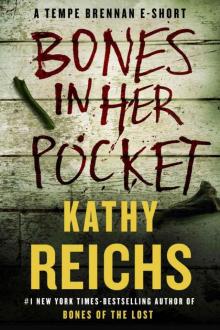 Bones in Her Pocket
Bones in Her Pocket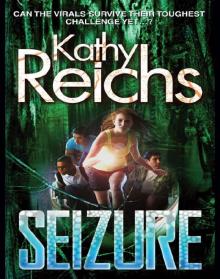 Seizure:
Seizure: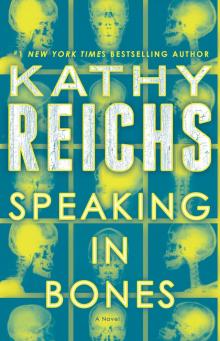 Speaking in Bones
Speaking in Bones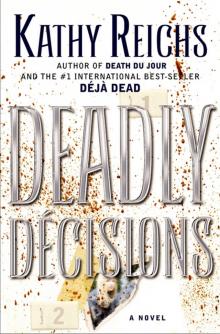 Deadly Decisions
Deadly Decisions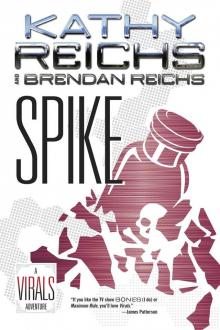 Spike
Spike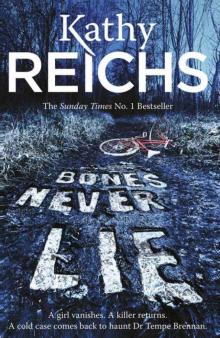 Bones Never Lie
Bones Never Lie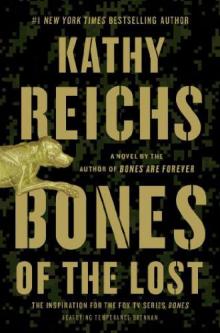 Bones of the Lost
Bones of the Lost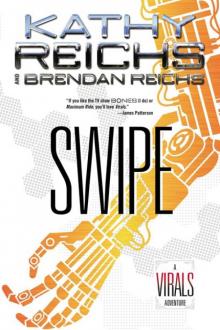 Virals 03.5 - Swipe
Virals 03.5 - Swipe Exposure
Exposure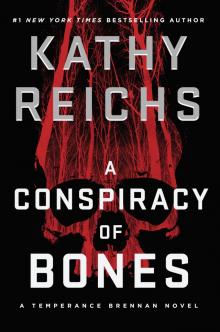 A Conspiracy of Bones
A Conspiracy of Bones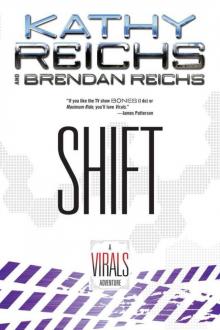 Shift (tory brennan)
Shift (tory brennan)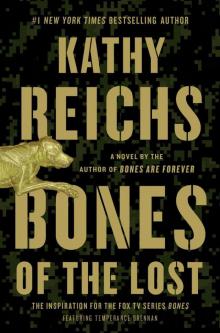 Bones of the Lost: A Temperance Brennan Novel tb-16
Bones of the Lost: A Temperance Brennan Novel tb-16 Virals tb-1
Virals tb-1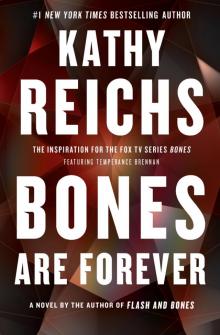 Bones Are Forever tb-15
Bones Are Forever tb-15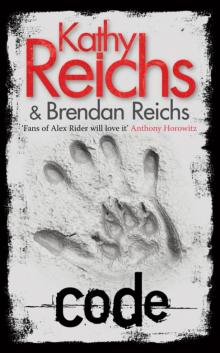 Code tb-3
Code tb-3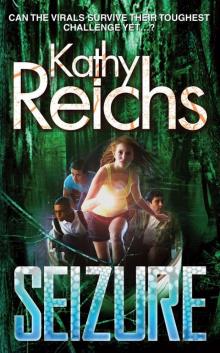 Seizure tb-2
Seizure tb-2 Deadly Descisions
Deadly Descisions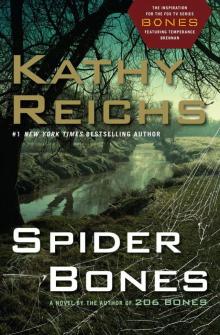 Spider Bones: A Novel
Spider Bones: A Novel